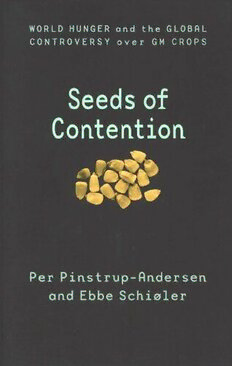
Seeds of Contention: World Hunger and the Global Controversy over GM Crops PDF
178 Pages·2001·3.989 MB·English
Most books are stored in the elastic cloud where traffic is expensive. For this reason, we have a limit on daily download.
Preview Seeds of Contention: World Hunger and the Global Controversy over GM Crops
Description:
In recent years the media have reported, frequently with alarm, on the increasing use of genetically modified crops in agriculture. Some groups have expressed concern about consumer safety and the risks of large-scale ecosystem damage. Others have noted the resulting shift of power away from locally controlled farming operations toward large agribusiness and biotech companies, and the particular vulnerability of farmers in the developing world to this trend.In Seeds of Contention: World Hunger and the Global Controversy over GM Crops, development specialists Per Pinstrup-Andersen and Ebbe Schiøler focus attention on the less discussed issues of the potential benefits and costs of genetically modified crops for developing countries. Pinstrup-Andersen and Schiøler review the basic issues and discuss the potential that such crops have for addressing the great needs of poor and undernourished peoples throughout the world. They explain how increased agricultural productivity is not enough in addressing the problem of famine. People in developing countries need crops that are disease-resistant, can fend off insect predators, and can withstand severe environmental conditions in order to produce larger crop yields.Pinstrup-Andersen and Schiøler are sober in their assessment of these prospects, for they acknowledge that GM crops alone will not solve the world's food problem. They argue, however, that they may be one element in the solution and people in developing countries should have information about benefits and risks and the freedom to make their own decisions about whether or not to grow and consume GM crops.
See more
The list of books you might like
Most books are stored in the elastic cloud where traffic is expensive. For this reason, we have a limit on daily download.
